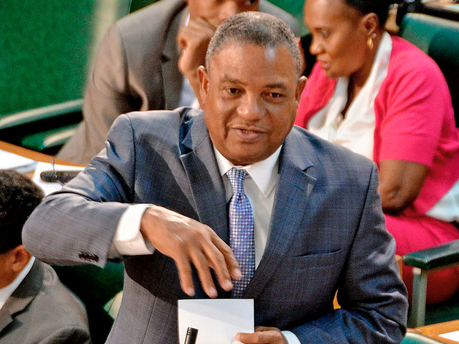NCC boss wants no political hands on new body
Daraine Luton, Senior Staff Reporter
WITH the new procurement bill proposing to split the National Contracts Commission (NCC) from the Office of the Contractor General, the joint select committee of Parliament considering the legislation has been asked to ensure that there is daylight between the proposed Public Procurement Commission and the political directorate.

Raymond McIntyre, chairman of the NCC, last Friday urged parliamentarians to purge the bill of clauses which require either a reporting responsibility to a minister or for a minister to have an input in the selection of commissioners.
“Without saying anything prejudicial about ministers and otherwise, we believe that this may jeopardise one of the intents of the commission, which is to be totally and absolutely impartial. So while we understand that the minister would be the conduit through which the public concerns are expressed, we believe that this clause should be modified because it appears that the minister is telling the commission what to do,” declared McIntyre.
“We believe that in terms of the public perception, wherever you see the minister involving himself or herself directly with the commission, that may be open to different perception,” McIntyre added.
The bill proposes that the minister, after consultation with the chairman of the commission, may give directions of a general character to the policy to be followed by the commission in the performance of its functions.
The Public Procurement Commission is being created to ensure prudence in the use of public funds, promote efficiency and integrity in the public procurement process, and ensure transparency, fairness and equity in the registration of persons, firms and entities in the ward of procurement contracts.
Chairman of the parliamentary committee, Horace Dalley, questioned how the commission would get policy direction if the minister was to be removed from the process.
In response, McIntyre said that the Parliament should seek to find an avenue for the passing down of policy directions without involving the political directorate in the process.
He suggested that the methods by which appointments to the commission will take place should be devoid of the input of politicians.
The bill provides for the governor general to appoint nine persons of high integrity, who have never been convicted of any offence involving fraud, dishonest or moral turpitude to serve on the commission.
The chairman of the commission should come from a panel of three, nominated by the contractor general, and recommended by the minister for appointment by the governor general.
minister’s involvement
The bill also makes provision for the minister to have a hand in the appointment of three other members of the commission.
Those appointments are reserved for persons with knowledge and experience in the field of procurement or complementary disciplines, and are recommended by the minister to the governor general for appointment.
These persons are to be selected from a pool of eight nominated by the Jamaican Bar Association, a public officer engaged in financial administration nominated by the financial secretary, and a public officer appointed by the minister responsible for works.
Dalley, seemingly puzzled by the suggestion, noted that the governor general cannot, by himself, appoint any person to state body.
“The Public Procurement Act must have someone who is the father or the mother of the act, it has to be owned by someone,” he added.
But McIntyre said that at present the minister is not involved in the appointment of the chairman of the NCC. He noted the governor general appoints an individual from a panel of three persons recommended by the contractor general.
“I see no reason for that to change,” he said.










